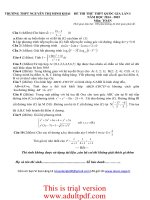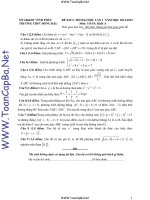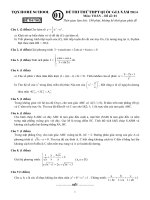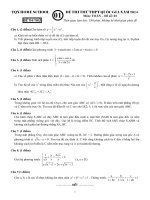Tải Đề luyện thi THPT Quốc gia môn tiếng Anh năm 2020 số 15 - Đề thi tốt nghiệp THPTQG môn Anh có đáp án
Bạn đang xem bản rút gọn của tài liệu. Xem và tải ngay bản đầy đủ của tài liệu tại đây (122.1 KB, 10 trang )
<span class='text_page_counter'>(1)</span><div class='page_container' data-page=1>
<b>ĐỀ THI THỬ THPTQG MÔN TIẾNG ANH</b>
<b>NĂM 2020 CÓ ĐÁP ÁN</b>
<i><b>Mark the letter A, B, C, or D on your answer sheet to indicate the word whose underlined</b></i>
<i><b>part differs from the other three in pronunciation in each of the following questions.</b></i>
<b>Question 1: A. implants</b> <b>B. enters</b> <b>C. upgrades</b> <b>D. doubles</b>
<b>Question 2: A. group</b> <b>B. soup</b> <b>C. through</b> <b>D. although</b>
<i><b>Mark the letter A, B, C, or D on your answer sheet to indicate the word that differs from</b></i>
<i><b>the other three in the position of primary stress in each of the following questions.</b></i>
<b>Question 3: A. water</b> <b>B. swimming</b> <b>C. between</b> <b>D. schoolboy</b>
<b>Question 4: A. confidence</b> <b>B. effective</b> <b>C. celebrate</b> <b>D. handicapped</b>
<i><b>Mark the letter A, B, C, or D on your answer sheet to indicate the correct answer to each</b></i>
<i><b>of the following questions.</b></i>
<b>Question 5: If she had known how awful this job was going to be, she ______ it.</b>
<b>A. would accept </b> <b>B. wouldn't accept </b>
<b>C. wouldn’t have accepted </b> <b>D. would have accepted</b>
<b>Question 6: He is exhausted. He ______ around the whole afternoon trying to clean the</b>
house before the guests arrive.
<b>A. has been running </b> <b>B. has run </b> <b>C. be running </b> <b>D. was running</b>
<b>Question 7: John would like ______ computer science.</b>
<b>A. to specialize </b> <b>B. specializing</b> <b>C. to specializing</b> <b>D. specialized</b>
<b>Question 8: The team tried for many years to win the competition and they finally ______.</b>
</div>
<span class='text_page_counter'>(2)</span><div class='page_container' data-page=2>
<b>Question 9: The government is aiming ______ 50% reduction ______ unemployment.</b>
<b>A. to/in </b> <b>B. at/in </b> <b>C. at/of </b> <b>D. for/of</b>
<b>Question 10: The man ______ to the party has not yet come.</b>
<b>A. invited</b> <b>B. to invite</b> <b>C. inviting</b> <b>D. to inviting</b>
<b>Question 11: Kate wasn’t at the party last weekend, ______?</b>
<b>A. won’t she</b> <b>B. is she</b> <b>C. didn’t she</b> <b>D. was she</b>
<b>Question 12: ______ the weather forecast, it will rain heavily later this morning.</b>
<b>A. According to</b> <b>B. Because of</b>
<b>C. Due to</b> <b>D. On account of</b>
<b>Question 13: He was pleased that things were going on ______.</b>
<b>A. satisfied</b> <b>B. satisfactorily </b> <b>C. satisfying</b> <b>D. satisfactory</b>
<b>Question 14: We had to write ______ story about a natural disaster for creative writing.</b>
<b>A. a</b> <b>B. an</b> <b>C. the</b> <b>D. Ø (no article)</b>
<b>Question 15: There is a steady ______ of young people from villages to the cities.</b>
<b>A. motion </b> <b>B. stampede </b> <b>C. current </b> <b>D. drift</b>
<b>Question 16: He still makes a lot of mistakes ______.</b>
<b>A. as soon as he has been thoroughly trained</b> <b>B. as he will be thoroughly trained</b>
<b>C. in case he was being thoroughly trained</b> <b>D. though he was thoroughly trained</b>
<b>Question 17: Can you ______ what it would be like to live without books?</b>
</div>
<span class='text_page_counter'>(3)</span><div class='page_container' data-page=3>
<b>Question 18: A computer is a(n) ______ storage device which manages large collections of </b>
data.
<b>A. electrical</b> <b>B. electronic</b> <b>C. electric</b> <b>D. electricity</b>
<b>Question 19: I only recently joined the firm so I'm still finding my ______. </b>
<b>A. arms</b> <b>B. feet</b> <b>C. fingers</b> <b>D. legs</b>
<i><b>Mark the letter A, B, C, or D on your answer sheet to indicate the word(s) CLOSEST in</b></i>
<i><b>meaning to the underlined word(s) in each of the following questions.</b></i>
<b>Question 20: Animals are being rapidly eliminated by man’s ever-increasing</b>
encroachment.
<b>A. terrified</b> <b>B. destroyed</b> <b>C. attacked</b> <b>D. approached</b>
<b>Question 21: It is a well-known fact that caffeine is a stimulant. So, don’t drink too much.</b>
<b>A. horrible</b> <b>B. relaxing</b> <b>C. famous</b> <b>D. comfortable </b>
<i><b>Mark the letter A, B, C, or D on your answer sheet to indicate the word(s) OPPOSITE in</b></i>
<i><b>meaning to the underlined word(s) in each of the following questions.</b></i>
<b>Question 22: Adding a garage will enhance the value of the house.</b>
<b>A. stabilize </b> <b>B. alter </b> <b>C. reduce </b> <b>D. increase</b>
<b>Question 23: I can say for sure that your father will hit the roof if he finds out that you have</b>
broken his watch.
<b>A. destroy the house</b> <b>B. get angry</b> <b>C. repair the roof</b> <b>D. become happy</b>
<i><b>Mark the letter A, B, C, or D on your answer sheet to indicate the option that best</b></i>
<i><b>completes each of the following exchanges.</b></i>
<b>Question 24: Mike is going to New York to study next week.</b>
</div>
<span class='text_page_counter'>(4)</span><div class='page_container' data-page=4>
<b>A. Better luck next time! </b> <b>B. Have a go!</b>
<b>C. God bless you! </b> <b>D. Have a nice trip!</b>
<b>Question 25: - Tim: “Where will you go on holiday?” - David: “__________”</b>
<b>A. The beach is nice, isn’t it? </b> <b>B. Probably I won’t think of.</b>
<b>C. Probably to the beach. </b> <b>D. I have a four-day vacation.</b>
<i><b>Read the following passage and mark the letter A, B, C, or D on your answer sheet to</b></i>
<i><b>indicate the correct word or phrase that best fits each of the numbered blanks from 26 to</b></i>
<i><b>30.</b></i>
Ever since it was first possible to make a real robot, people have been hoping for the
invention of a machine that would do all the necessary jobs around the house. If boring and
repetitive factory work could be (26) ______ by robots, why not boring and repetitive
household chores too?
For a long time, the only people who really gave the problem their attention were
amateur inventors. And they came up against a major difficulty. That is, housework is (27)
______ very complex. It has never been one job, it has always been many. A factory robot
carries out one task endlessly until it is reprogrammed to do something else. It doesn't run
the whole factory. A housework robot, on the other hand, has to do (28) ______ different
types of cleaning and carrying jobs and also has to cope with all the different shapes and
positions of rooms, furniture, ornaments, cats and dogs.
(29) ______ , there have been some developments recently. Sensors are available to
help the robot locate objects and avoid obstacles. We have the technology to produce the
hardware. All that is missing is the software - the programs (30) ______ will operate the
machine.
</div>
<span class='text_page_counter'>(5)</span><div class='page_container' data-page=5>
<b>Question 28: A. any</b> <b>B. little</b> <b>C. several</b> <b>D. few</b>
<b>Question 29: A. Because</b> <b>B. However</b> <b>C. Although</b> <b>D. So that</b>
<b>Question 30: A. who</b> <b>B. what</b> <b>C. that</b> <b>D. where</b>
<i><b>Read the following passage and mark the letter A, B, C, or D on your answer sheet to</b></i>
<i><b>indicate the correct answer to each of the questions from 31 to 35.</b></i>
Telecommunicating is a form of computer communication between employees’ homes
and offices. For employees whose jobs involve sitting at a terminal or word processor
entering data or typing reports, the location of the computer is of no consequence. If the
machine can communicate over telephone lines, when the work is completed, employees can
dial the office computer from a distant site and transmit the material to their employers. A
recent survey in USA Today estimates that there are approximately 8.7 million
telecommuters. Although the numbers are rising annually, the trend does not appear to be as
significant as predicted when Business Week published “The Portable Executive” as its
cover story a few years ago.
Why hasn't telecommuting become more popular? Clearly, change simply takes time.
But in addition, there has been active resistance on the part of many managers. These
executives claim that supervising the telecommuters in a large work force scattered across
the country would be too difficult, or, at least, systems for managing them are not yet
developed, thereby complicating the manager's responsibilities.
It is also true that employees who are given the option of telecommuting are often
reluctant to accept the opportunity. Most people feel that they need regular interaction with a
group, and many are concerned that they will not have the same consideration for
advancement if they are not more visible in the office setting. Some people feel that even
when a space in their homes is set aside as a work area, they never really get away from the
office.
<b>Question 31: What is the main idea of the passage?</b>
</div>
<span class='text_page_counter'>(6)</span><div class='page_container' data-page=6>
<b>C. How to set aside a work area at home</b>
<b>D. Technologies’ roll in making telecommuting possible</b>
<b>Question 32: The word “terminal” in paragraph 1 mostly means ______.</b>
<b>A. office</b> <b>B. table</b> <b>C. room</b> <b>D. building</b>
<b>Question 33: According to the passage, the number of American workers involving in </b>
telecommuting is ______.
<b>A. More than 8 million</b> <b>B. More than predicted in Business Week</b>
<b>C. Fewer than estimated in USA Today</b> <b>D. Fewer than last year</b>
<b>Question 34: The word “them” in paragraph 2 refers to ______.</b>
<b>A. systems</b> <b>B. telecommuters</b> <b>C. executives</b> <b>D. responsibilities</b>
<b>Question 35: Which of the following is TRUE about the reason why telecommuting has not </b>
become popular?
<b>A. Employees need regular interaction with their families.</b>
<b>B. Employees feel that a work area in their home is away from the office.</b>
<b>C. Employees are worried about the promotion if they are not seen at the office.</b>
<b>D. Employees are ignorant of telecommuting.</b>
<i><b>Read the following passage and mark the letter A, B, C, or D on your answer sheet to</b></i>
<i><b>indicate the correct answer to each of the questions from 36 to 42.</b></i>
Unlike these fish, which are actually extinct, the coelacanth is a type of fish that was
believed to be extinct. However, an unexpected twentieth-century rediscovery of living
coelacanths has brought about a reassessment of the status of this prehistoric sea creature
that was believed to have long since disappeared from the Earth.
</div>
<span class='text_page_counter'>(7)</span><div class='page_container' data-page=7>
same time as the dinosaurs. The prehistoric coelacanth studied by palaeontologists had
distinctive characteristics that differentiated it from other fish. It was named for its hollow
spine and was known to have been powerful carnivores because of its many sharp teeth and
a special joint in the skull that allowed the ferocious teeth to move in coordination with the
lower jaw. It also had a pair of fins with unusual bony and muscular development that
allowed the coelacanth to dart around the ocean floor. These fins also enable the coelacanth
to search out prey trying to hide on the ocean bottom.
In 1983, a living specimen of the coelacanth was discovered in the catch of a fishing
boat off the coast of South Africa, and since then numerous other examples of the coelacanth
have been found in the waters of the Indian Ocean. This modern version of the coelacanth is
not exactly the same as its prehistoric cousin. Today’s coelacanth is larger than its
prehistoric relative, measuring up to six feet in length and weigh up to 150 pounds.
However, the modern version of the coelacanth still possesses the characteristic hollow spine
and distinctive fins with their unusual bony and muscular structure.
<b>Question 36: What is the most suitable title for the passage?</b>
<b>A. Fish that was once extinct</b> <b>B. Fish that, surprisingly, is not extinct</b>
<b>C. Fish that is extinct</b> <b>D. Fish that is becoming extinct</b>
<b>Question 37: The word “determined” in paragraph 2 is closest in meaning to ______.</b>
<b>A. announced</b> <b>B. indicated</b> <b>C. performed</b> <b>D. confirmed</b>
<b>Question 38: According to paragraph 2, why was coelacanth believed to have died out at the</b>
same time as the dinosaurs?
<b>A. Coelacanth arrived on the Earth at the same time as dinosaurs.</b>
<b>B. Dinosaurs have never appeared on the Earth.</b>
</div>
<span class='text_page_counter'>(8)</span><div class='page_container' data-page=8>
<b>Question 39: According to the passage, why are scientists sure that the prehistoric</b>
coelacanth was a flesh-eater?
<b>A. Because of its hollow spine</b>
<b>B. Because of the shape and movement of the teeth</b>
<b>C. Because of its unusual bony and muscular development</b>
<b>D. Because of the size of the skull</b>
<b>Question 40: The word “ferocious” in paragraph 2 is closest in meaning to ______.</b>
<b>A. fierce</b> <b>B. furious</b> <b>C. precious</b> <b>D. weak</b>
<b>Question 41: The word “it” in paragraph 2 refers to ______.</b>
<b>A. coordination</b> <b>B. jaw</b> <b>C. joint</b> <b>D. coelacanth</b>
<b>Question 42: What is NOT true about the prehistoric coelacanth, according to the passage?</b>
<b>A. It measured as much as six feet in length.</b> <b>B. It was smaller than the modern</b>
coelacanth.
<b>C. It had a hollow spine and distinctive fins.</b> <b>D. It weighed less than 150 pounds.</b>
<i><b>Mark the letter A, B, C, or D on your answer sheet to indicate the underlined part that</b></i>
<i><b>needs correction in each of the following questions.</b></i>
<b>Question 43: Some bacteria is extremely harmful, but others are regular used in producing</b>
foods.
<b>A. is</b> <b>B. but</b> <b>C. used</b> <b>D. foods</b>
<b>Question 44: Watching TV, drinking tea, and play chess are my father’s hobbies. </b>
<b>A. drinking</b> <b>B. play</b> <b>C. are</b> <b>D. father’s</b>
</div>
<span class='text_page_counter'>(9)</span><div class='page_container' data-page=9>
<b>A. way</b> <b>B. that</b> <b>C. put</b> <b>D. at</b>
<i><b>Mark the letter A, B, C, or D on your answer sheet to indicate the sentence that is closest</b></i>
<i><b>in meaning to each of the following questions.</b></i>
<b>Question 46: It is much more difficult to speak English than to speak French.</b>
<b>A. To speak French is more difficult than to speak English.</b>
<b>B. To speak English is more difficult than to speak French.</b>
<b>C. Speaking English is most difficult than to speak French.</b>
<b>D. Speaking French is as difficult as speaking English.</b>
<b>Question 47: “I will start walking tomorrow afternoon,” Minh said.</b>
<b>A. Minh said that I will start walking the following afternoon.</b>
<b>B. Minh said that she would start walking the following afternoon.</b>
<b>C. Minh said that I would start walking tomorrow afternoon.</b>
<b>D. Minh said that she will start walking tomorrow afternoon.</b>
<b>Question 48: There is no need for you to leave the house now.</b>
<b>A. You mustn’t leave the house now.</b> <b>B. You needn’t leave the house now.</b>
<b>C. You have to leave the house now.</b> <b>D. You should leave the house now.</b>
<i><b>Mark the letter A, B, C, or D on your answer sheet to indicate the sentence that best</b></i>
<i><b>combines each pair of sentences in the following questions.</b></i>
<b>Question 49: You can go out. Make sure you come back before 9 p.m.</b>
<b>A. You can go out provided that you come back before 9 p.m.</b>
<b>B. You can’t go out if you come back before 9 p.m.</b>
</div>
<span class='text_page_counter'>(10)</span><div class='page_container' data-page=10>
<b>D. You can go out unless you come back before 9 p.m.</b>
<b>Question 50: The soccer team knew they lost the match. They soon started to blame each</b>
other.
<b>A. Not only did the soccer team lose the match but they blamed each other as well.</b>
<b>B. No sooner had the soccer team started to blame each other than they knew they lost the</b>
match.
<b>C. As soon as they blamed each other, the soccer team knew they lost the match. </b>
<b>D. Hardly had the soccer team known they lost the match when they started to blame each</b>
other.
<b>ĐÁP ÁN</b>
</div>
<!--links-->









